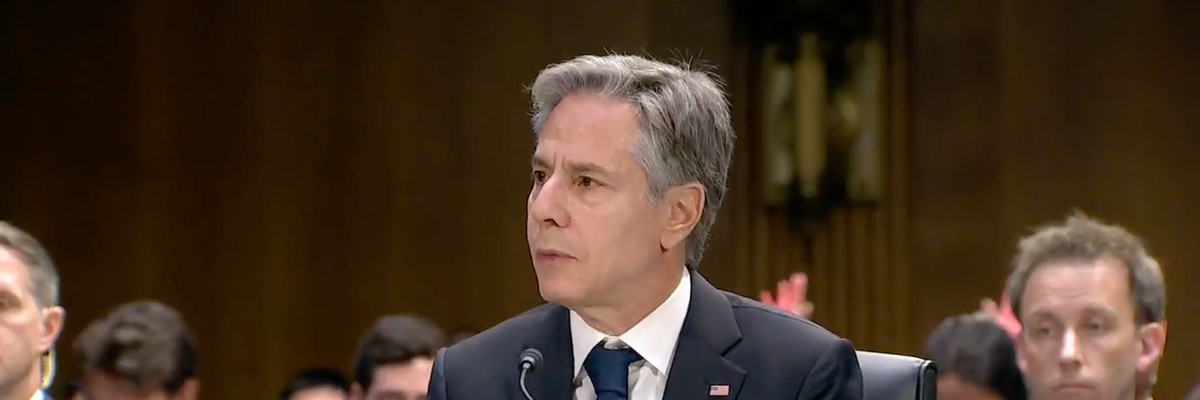The Biden administration’s funding request for Israel and Ukraine will be a boon for the American economy, argued Secretary of State Antony Blinken and Secretary of Defense Lloyd Austin in a high profile hearing on Tuesday.
“When we send our friends munitions from our stockpiles, the money to replenish our supplies strengthens our military readiness, and we invest in American industry and American workers,” Austin told the Senate Appropriations Committee. “Some $50 billion of this supplemental request would flow through our defense industrial base, creating American jobs in more than 30 states.”
The argument has become central to the Biden administration’s messaging in recent weeks as it seeks Republican support for its $105 billion request to fund aid for Ukraine and Israel; disaster relief; and border security.
It is unclear whether the “jobs” argument has convinced Ukraine aid skeptics in the House, who have pushed for greater restrictions on future funding. But it resonated with many senators on the Appropriations Committee, who applauded the potential investment in America’s economy and defense industrial base.
Experts, for their part, argue that weapons spending is far less effective at creating jobs than other forms of government investment, including education and healthcare.
On Monday, Newly minted House Speaker Mike Johnson (R-La.) introduced a separate bill that only includes funding for Israel. Blinken argued against the move, contending that Russia’s war on Ukraine and Hamas’s attack on Israel are fundamentally linked. Austin added that the Ukrainian military would collapse if American support were cut off.
Protestors repeatedly interrupted Blinken’s remarks in the first half hour of the hearing, with at least six different demonstrators calling for an immediate ceasefire in Gaza and accusing the White House of supporting “genocide.” Multiple participants in the protest appeared to be affiliated with Code Pink, a prominent antiwar organization.
“I also hear very much the passions expressed in this room,” Blinken said after demonstrators were removed. “All of us are committed to the protection of civilian life.”
“But all of us know the imperative of standing up with our allies and partners when their security, when their democracies are threatened,” he added. “We stand resolutely with them even as we stand resolutely for the protection of innocent civilians.”
Blinken and Austin defended U.S. policy in Ukraine and Israel, frequently invoking alleged war crimes committed by Russian forces and Hamas. “Israel has not only the right but the duty to defend itself,” Blinken said, echoing a frequent argument from the Biden administration in recent weeks. “No nation would tolerate” Hamas continuing to operate on their territory, he continued.
Neither official directly addressed claims that Israel has violated international law through alleged disproportionate violence against Gazan civilians, use of banned munitions like white phosphorus, and efforts to prevent aid from reaching Gaza. Blinken “stressed the need for Israel to abide by the law of war” but accused Hamas of using civilians as “human shields.”
Blinken highlighted that Gazans “desperately need” humanitarian assistance in order to survive. He also noted that the U.S., Israel, and Egypt have established a system whereby every United Nations-operated truck “is checked by Israel” and Egyptian authorities in order to prevent Hamas from transporting weapons in aid shipments. Blinken added that no aid has been diverted to help the militant organization, which both he and Austin repeatedly compared to the Islamic State.
Austin, for his part, addressed the escalation of attacks on U.S. forces in Iraq and Syria by Iranian-backed militias, which the Pentagon has responded to with at least one set of airstrikes on a militia base in Syria. “We reserve the right to respond at a place and time of our choosing,” he said. “We will do what’s necessary to protect our troops and deter this type of behavior.”
When pressed by Sen. Lindsey Graham (R-S.C.), Austin refused to commit to a direct attack on Iran if an Iranian-backed militia killed an American soldier in a strike in Iraq or Syria.
- What will new Speaker Johnson do about Ukraine-Israel aid? ›
- Aid for Israel and Ukraine is not an American jobs program ›
- Lindsey Graham wants to force more Ukrainian men into the draft | Responsible Statecraft ›














